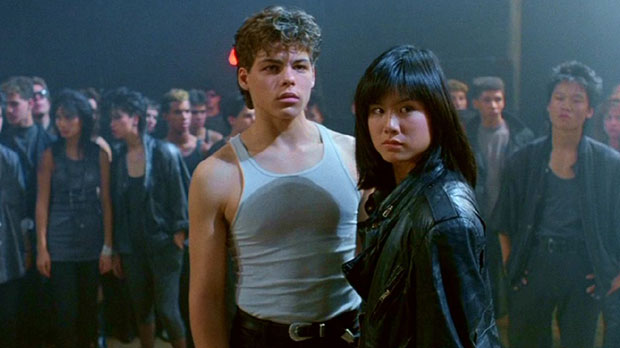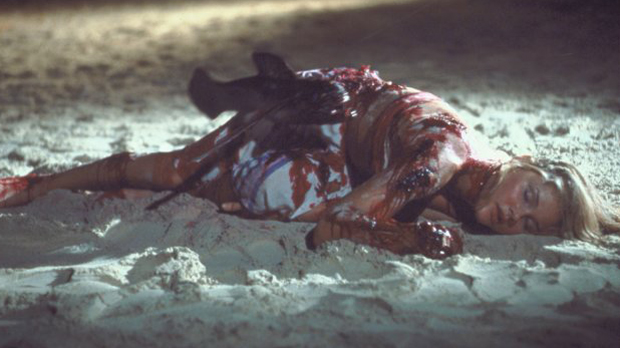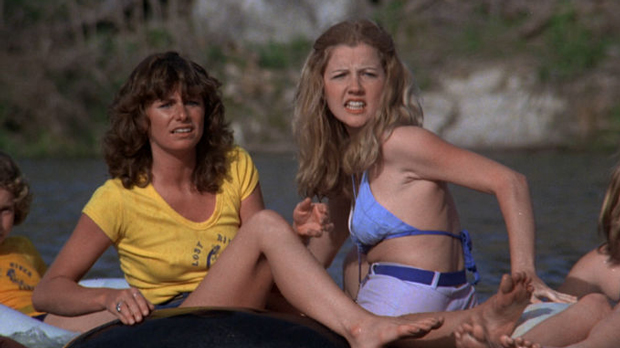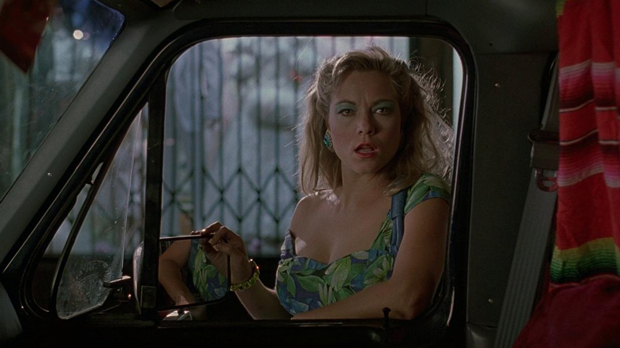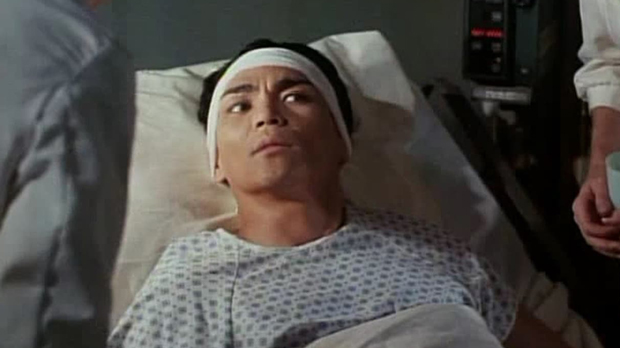 China Girl (1987) Vestron Pictures/Drama RT: 90 minutes Rated R (strong violence, language, some sexual material) Director: Abel Ferrara Screenplay: Nicholas St. John Music: Joe Delia Cinematography: Bojan Bazelli Release date: September 25, 1987 (US) Cast: Richard Panebianco, Sari Chang, James Russo, Russell Wong, David Caruso, Joey Chin, Judith Malina, James Hong, Robert Miano, Paul Hipp, Doreen Chan, Randy Sabusawa, Keenan Leung. Box Office: $1.2M (US)
China Girl (1987) Vestron Pictures/Drama RT: 90 minutes Rated R (strong violence, language, some sexual material) Director: Abel Ferrara Screenplay: Nicholas St. John Music: Joe Delia Cinematography: Bojan Bazelli Release date: September 25, 1987 (US) Cast: Richard Panebianco, Sari Chang, James Russo, Russell Wong, David Caruso, Joey Chin, Judith Malina, James Hong, Robert Miano, Paul Hipp, Doreen Chan, Randy Sabusawa, Keenan Leung. Box Office: $1.2M (US)
Rating: ***
“In fair Manhattan where Abel Ferrara lays his tale, two neighborhoods alike in dignity produce a pair of star-crossed lovers.”
Can you identify this misquote? That’s right, it’s Romeo and Juliet, Shakespeare’s timeless tragedy of forbidden love born of hatred. A staple of high school lit classes, it also served as the inspiration for the musical West Side Story in which feuding families become rival gangs. In 1987, the director behind the grindhouse classics Ms. 45 and Fear City took a crack at the material with China Girl. Working from a screenplay by frequent collaborator Nicholas St. John, Ferrara keeps the gangs and prejudice but ditches the singing and dancing to tell the woe-filled story of Tony and Tye, two teens caught in the crossfire of a territorial dispute.
The boy-meets-girl set-up in China Girl is a familiar one. Tony (Panebianco, Street Hunter) first spots Tye (Chang) across a crowded dance floor at a club. BAM! It’s love at first sight. They come together and move to the music, eyes locked together until Tye’s cousin Yung (Wong, New Jack City) puts an abrupt stop to their start. Here’s where the “it’s complicated” part of their story comes into play. Tony’s from Little Italy; Tye’s from Chinatown. The Italians hate the Chinese and vice versa. Yung orders Tye to stay away from Tony. Tony’s older brother Alby (Russo, Beverly Hills Cop) echoes this sentiment. A brewing gang war certainly doesn’t help matters any. To be more specific, it’s the youths that want to fight in the streets. The elders from both sides- i.e. the Tongs and the Mafia- are working towards peace. Tony and Tye don’t care about any of this; all they want is to be together. Ah, young love!
I’ve been talking a lot about the love story at the center of China Girl, but if I’m being honest it’s the movie’s weakest aspect. The two leads, Panebianco and Chang, are attractive enough. Their characters’ idealism shines through the atmosphere of racial prejudice surrounding them. They dream of a brighter future where details like race and skin tone no longer matter. One almost expects them to break into a synthesized rendition of “Somewhere”. The problem is neither one of them can act. They never really convey the emotional urgency, the idea that they will die if they can’t be together, one expects from Romeo and Juliet lovers. As such, their story takes a back seat to the gang stuff.
As a filmmaker, Ferrara has always had an eye for detail. He consistently strives to make his films look as authentic as possible. He makes excellent use of the natural locations in Little Italy and Chinatown. I’m not just talking about the busy streets lined with pizza joints and Chinese restaurants (depending on which side of Canal Street you’re on); I’m also talking about the dark back alleys with their chain-link fences. He bathes China Girl in what I call “stylized realism”. He keeps things on a gritty street level only the streets have a slick, polished look. The streets are tough and violent, but the fights are clearly choreographed. I hesitate to use the term but China Girl contains an element of fantasy that keeps the viewer one step removed from Ferrara’s reality.
When China Girl opened in September ’87, it played at 193 theaters across the country and none of them were in Philadelphia. I didn’t see it until a few years later when I picked up a used VHS copy at a flea market. Already a fan of Ferrara, I was impressed with it. Like a few of his films, it walks the line between grindhouse and arthouse. It’s a mix of class and sleaze. Its anti-racism message is obvious. For me, it works better as a crime drama. In addition to the rivalry between the two gangs, it also depicts the one that exists between the young and old generations in both worlds. The youth gangs are hot-headed and volatile while the elder crime bosses are level-headed and pragmatic. The kids don’t want to listen to the adults. Of course it’s going to lead to tragedy.
In general, the acting is pretty good in China Girl, but I feel I’d be remiss in not acknowledging the brilliant overacting of David Caruso (1995’s Kiss of Death) as Alby’s best friend Mercury, a loud kind of guy who takes great delight in taunting his Chinese neighbors by making slant eyes at them. Nobody does overacting like Caruso. I realize it’s incongruous with Ferrara’s serious intentions but I can’t NOT love it. I also dig the cheesy 80s score, all synthesizer and beat. The fight scenes are nicely done. The cinematography by Bojan Bazelli is terrific.
While not perfect by any means, China Girl is a damn good movie. The leads might not be the best actors in any world, but they’re likable enough that you give them a pass. I only wish their love story was stronger. With more tangible emotion, Ferrera could have had something with China Girl. Please don’t take that to mean I don’t like China Girl. Quite the opposite, I like it a lot even if the central love story is more sweet than passionate. It’s still one of Ferrara’s best films.
